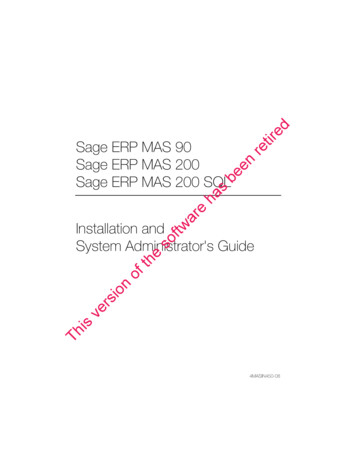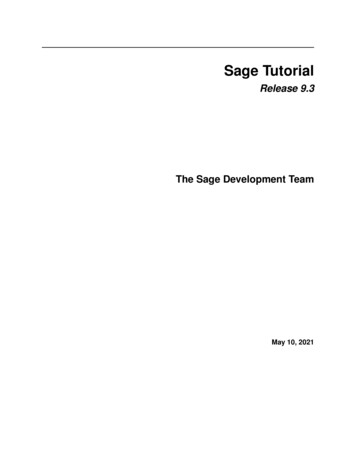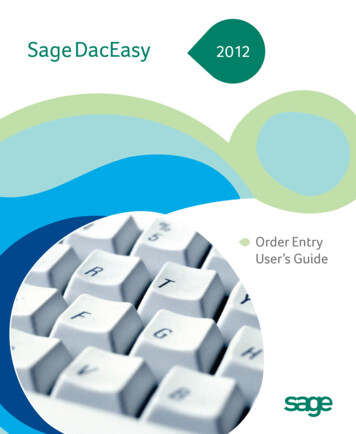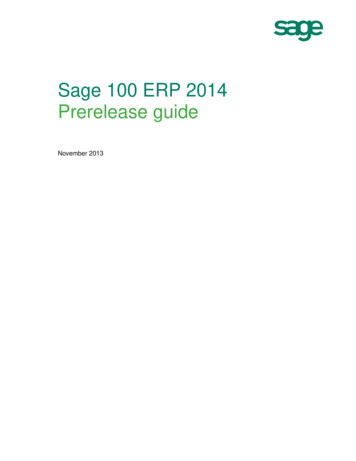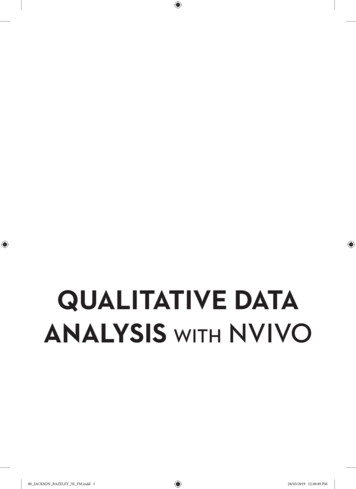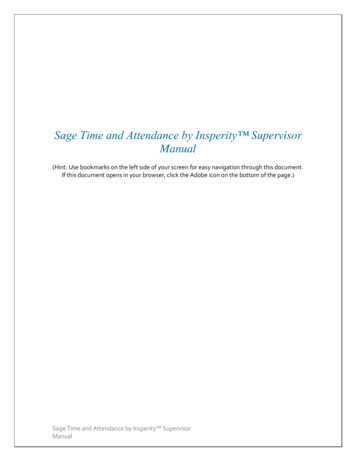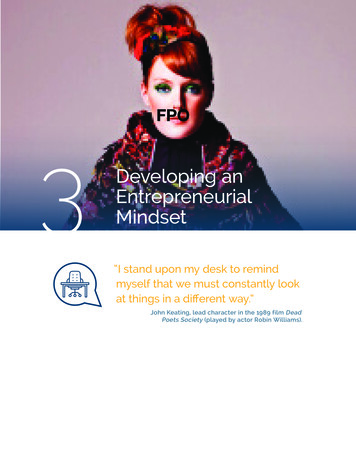
Transcription
FPOw3Developing anEntrepreneurialMindset“I stand upon my desk to remindmyself that we must constantly lookat things in a different way.”John Keating, lead character in the 1989 film DeadPoets Society (played by actor Robin Williams).
Learning ObjectivesChapter OutlineAppraise the effectiveness of mindset inentrepreneurship.3.1The Power of Mindset3.2What Is Mindset?3.2Define “mindset” and explain itsimportance to entrepreneurs.3.3The Self-leadership Habit3.3Explain how to develop the habit ofself-leadership.3.4The Creativity Habit3.5The Improvisation Habit3.4Explain how to develop the habit ofcreativity.3.6The Mindset as a Pathway to Action3.5Explain how to develop the habit ofimprovisation.3.6Relate the mindset for entrepreneurshipto entrepreneurial action.3.13.1 THE POWER OF MINDSET LO 3.1Appraise the effectiveness of mindset in entrepreneurship.In Chapter 2, we learned about the practice of entrepreneurship. Part of thepractice is being in the right mindset to start and grow a business. In this chapter’sEntrepreneurship in Action feature, we describe how Robert Donat combined hisknowledge from working in two diverse areas—the Army and hedge funds—to createa new hardware/software fleet tracking solution. Donat states that he owes hissuccess to his previous work experience, and the technical and business knowledgehe gained during that time.Of course, knowledge is extremely important, but what made Donat take thatknowledge and apply it so successfully to the GPS world? What motivated him to starthis own business? We could say that Donat had the right mindset to start a business.He wasn’t quite sure what he wanted to do, but he had an open mind, which madehim curious about potential opportunities in the tracking solution industry. Thanksto experience, he had the confidence to take action by knocking on doors and gainingsupport for this idea. He also believed enough to persist with his idea even in the faceof high financial risk. It was Donat’s mindset that kept him on the right track andultimately led to GPS Insight’s success.The words to “Rise and Shine” in Figure 3.1 have been transcribed from anathletic and running motivation video on YouTube. It is a good description of howour mindset operates. When we wake up in the morning, we have a choice betweenthe “easy” way and the “right” way. Depending on our mindset, we will choose onepath or the other.
4 CHAPTER 3Developing an Entrepreneurial MindsetENTREPRENEURSHIP IN ACTIONRobert Donat,Founder & CEO, GPS InsightRobert Donat stumbled upon his “big idea” somewhatunexpectedly. Following a stint in the Army and along career in hedge funds, he was looking for a newjob after his family relocated to Scottsdale, Arizona.A friend made an introduction, and soon Donat wasapplying the skills he’d learned as an artillery officerto help a local trucking business find the ideal fleettracking product. After looking at five systems thatwere on the market at the time, he decided he coulddo it better.Just ten years after that fortuitous 2004 decision,the hardware/software fleet tracking solution thatDonat built from that one-time gig is a leader in itsspace. The company, GPS Insight, has placed onInc. Magazine’s “5,000” list of the fastest growingcompanies in America every year since 2009, andhas been showered with awards including theTechAmerica Terman, the Deloitte Fast 500, andthe Global 100. By 2014 GPS Insight was not onlycompletely debt free, but also on track to achieve 100 million in cumulative revenue.Yet the road hasn’t been easy, and Donat stillconsiders his venture a startup. “Every sale has to beearned from knocking on a (virtual) door or meetingat a conference, and our sales cycle ranges from 90days (typical) to two years,” he says. It took somecreativity (and serious faith in the idea) to build outand pay for the infrastructure he needed. He sold acompany he was part owner of, took out 150,000 inbank loans, and secured an additional 200,000 froman outside investor. The company did not becomeprofitable until it had approached 2 million incumulative losses. Donat explains, “We were creativeabout doing the most with as little as possible, andentered many obscenely expensive (18-22%) leasespurchasing computer hardware since it was the onlyway to get money. We even leased three copiersat double their cost over five years in order to geta 30,000 ‘rebate’ up front which helped us makepayroll in year three.”Yet within 18 months of becoming profitable,the company was able to pay back the moneyborrowed, and then some. “There was no formalbusiness plan,” Donat adds. “I just saw the potentialfor growth and knew that if I threw resources at thecompany’s growth, it would pay off given the highreturn on investment to customers and the recurringrevenue model which ultimately became verylucrative.”Robert Donat holds a bachelor’s degree in finance,plus two master’s degrees: one in finance and onein computer science. For the Army, he went throughofficer’s school—twice. He honed his real-worldbusiness skills working for companies like the CitadelInvestment Group LLC as manager of databasetechnology. Cumulatively, he believes his robustrésumé and knowledge base have been key to hissuccess. To budding entrepreneurs, his advice is:“Wait until you have some solid skills and experiencein paid positions for others before thinking you cando something on your own with a high likelihood ofsuccess. I learned a number of very costly technicaland business lessons when working for othercompanies either as an employee or a contractor.Only after roughly six years of experience did I startconsulting, and after four years of consulting, I wasready to start my own company. Any earlier than thatand I wouldn’t have had the experience, maturity,business and technical knowledge, or savings, tomake this company work.”CRITICAL THINKING QUESTIONS1.In what ways do you see mindset, or mentalattitude, playing a role in Robert Donat’ssuccess?2.If you had been at the helm of GPS Insightwhen it was approaching 2 million incumulative losses, would you have decided tocontinue in business? What information wouldyou have needed to know in order to decideone way or the other?3.Do you agree that a buddingentrepreneur should wait and accumulateexperience working for others beforestarting an entrepreneurial venture? Why orwhy not? Source: R. Donat, personal interview, Oct 5, 2014.
CHAPTER 3Developing an Entrepreneurial Mindset 5FIGURE 3.1Rise and ShineMaster the contentedge.sagepub.com/neckentrepreneurshipIt’s six am and your hand can’t make it to the alarmclock fast enough before the voices in your head starttelling you that it’s too early, too cold, and too darkto get out of bed. Aching muscles lie still in rebellionpretending not to hear your brain commanding them tomove. A legion of voices are shouting their permissionfor you to hit the snooze button and go back to dreamland. But you didn’t ask their opinion. The one voiceyou’re listening to is a voice of defiance. The voicethat says there’s a reason you set that alarm in the firstplace. So sit up, put your feet on the floor and don’tlook back, because we’ve got work to do. Welcome tothe grind.For what’s each day but a series of conflictsbetween what is the right way and the easyway. Ten thousand streams fan out like a riverdelta before you, each promising a path of leastresistance. Thing is you’re headed up stream, andwhen you make that choice and decide to turn yourback on what is comfortable and safe and whatsome would call common sense, well that’s dayone. From there it only gets tougher. So make surethis is something you want, because the easy waywill always be there. Ready to wash you away. Allyou have to do is pick up your feet.But you aren’t going to, are you? With each stepcomes the decision to take another. You’re on yourway now, but this is no time to dwell on how far you’vecome. You’re in a fight with an opponent you can’t see,oh but you can feel him on your heels can’t you, feelhim breathing down your neck. You know what that is,that’s you, your fears your doubts your insecurities all lined up like a firing squad ready to shoot you outof the sky. But don’t lose heart, because while they’renot easily defeated they are far from invincible.Remember this is the grind the battle royal betweenyou and your mind, your body and the devil on yourshoulder telling you this is a game, this is a waste oftime, your opponents are stronger than you. Drownout the voices of uncertainty with the sound of yourown heartbeat. Burn away your self-doubt with a firelit beneath you. Remember what we’re fighting forand never forget that momentum is a cruel mistress.She can turn on a dime with the smallest mistake. Andshe is ever searching for the weakness in your armor,that one tiny thing you forgot to prepare for. So aslong as the devil is in the details, the question remainsis that all you got? Are you sure?When the answer is yes, and you’ve done all you canto prepare yourself for battle, then it’s time to go forthand boldly face your enemy - the enemy within.Only now you must take that fight in the open, intohostile territory. You’re a lion in a field of lions all facingthe same elusive prey, with a desperate starvation thatsays victory is the only thing that can keep you alive.So believe that voice that says you can, you can run alittle faster you can throw a little harder and for you thelaws of physics are merely a suggestion.Luck is the last dying wish of those who believewinning can happen by accident, sweat is for thosewho know it’s a choice. So decide now, becausedestiny waits for no man. So when your time comesand a thousand different voices are trying to tell youyou’re not ready for it, listen to that one lone voice ofdecent that says you are ready, you are prepared, it’sall up to you now.So rise and shine.
6 CHAPTER 3Developing an Entrepreneurial Mindset3.2 WHAT IS MINDSET? LO 3.2 Define “mindset” and explain its importance to entrepreneurs.Fixed mindset: theassumption held by peoplewho perceive their talentsand abilities as set traits.Growth mindset: theassumption held by peoplewho believe that theirabilities can be developedthrough dedication, effort,and hard work.We have been using the term mindset since Chapter 1, so perhaps it is time we stoppedto examine what it actually means. It has traditionally been defined as “the establishedset of attitudes held by someone”.1 Yet, research has shown that our mindset needn’t be“set” at all. Stanford University psychologist Carol Dweck proposes that there are twodifferent types of mindset: a fixed mindset and a growth mindset (see Figure 3.2). 2In a fixed mindset, people perceive their talents and abilities as set traits. They believethat brains and talent alone are enough for success and go through life with the goal oflooking smart all the time. They take any constructive criticism of their capabilities verypersonally, and tend to attribute others’ success to luck (see Research at Work for a studyabout luck) or some sort of unfair advantage. People with a fixed mindset will tell themselvesthey are no good at something to avoid challenge, failure, or looking dumb.On the other hand, in a growth mindset, people believe that their abilities canbe developed through dedication, effort, and hard work. They do not think brainsand talent are the key to lifelong success, but merely the starting point. People with agrowth mindset are eager to enhance their qualities through lifelong learning, training,and practice. Unlike people with fixed mindsets, they see failure as an opportunity toimprove their performance, and to learn from their mistakes. Despite setbacks, they tendto persevere rather than giving up.Recent studies have found that overly praising or being praised simply for ourintelligence can create a fixed mindset. For example, using a series of puzzle tests,Dweck discovered that 5th-grade children who were praised for their hard work andeffort on the first test were far more likely to choose the more difficult puzzle next timeFIGURE 3.2What Kind of Mindset Do You Have?GrowthMindsetI can learn anything I want to.When I’m frustrated, I persevere.I want to challenge myself.When I fail, I learn.Tell me I try hard.If you succeed, I’m inspired.My effort and attitude determineeverything.FixedMindsetI’m either good at it, or I’m not.When I’m frustrated, I give up.I don’t like to be challenged.When I fail, I’m no good.Tell me I’m smart.If you succeed, I feel threatened.My abilities determine everything.Source: Created by Reid Wilson @ wayfaringpath Icon from thenounproject.com . Retrieved from vs-fixed-mindset-which-do-you-have/
CHAPTER 3Developing an Entrepreneurial Mindset 7RESEARCH AT WORKStudy on Luck3In the early 1990s, British psychologist and researcherRichard Wiseman carried out an experiment onluck to determine what defines a lucky or unluckyperson. Over several years, using advertisements innewspapers and magazines, Wiseman sought outpeople who felt consistently lucky or unlucky. Heinterviewed them and identified 400 volunteers whomhe asked to participate in the following experiment.Wiseman’s overall findings have revealed that“although unlucky people have almost no insightinto the real causes of their good and bad luck, theirthoughts and behaviors are responsible for much oftheir fortune” (or misfortune).The 400 participants were divided into two groups:those who considered themselves lucky, and thosewho considered themselves unlucky. Both groupswere given a newspaper and asked to count how manyphotographs in contained.1.Choose someone you consider highlysuccessful and assess the story of his or hersuccess. In what ways does the success storyshow good luck and/or bad luck?2.Do you consider yourself a particularly luckyor unlucky person? Or do you fall somewherein the middle? Give some reasons to supportyour answer.3.Can you think of a chance opportunity thatcame your way because you were open to it?How might you make yourself more open to“lucky” opportunities in the future? It took approximately 2 minutes, on average, for theunlucky people to count all the photos, but it only tooka few seconds for the lucky people. Why? Because thelucky people had spotted a large message occupyingmore than half of the newspaper’s second page thatstated: “Stop counting. There are 43 photographs inthis newspaper.” The unlucky people had missed thischance opportunity because they were too focusedwhat they thought they were supposed to look for.Wiseman concluded that unlucky people tend tomiss opportunities because they are too focused onsomething else; whereas lucky people tend to be moreopen to recognizing chance opportunities.CRITICAL THINKING QUESTIONSSourcesWiseman, R. 2003. January 9. Be lucky - it’s an easy skill to learn.The Telegraph. Retrieved from ucky-its-an-easy-skill-to-learn.htmlWiseman, R. 2003. The luck factor: The four essential principles.New York, NY: Hyperion.round. In contrast, children who were praised for being smart or intelligent after the firsttest chose the easy test the second time around.It seems that the children who had been praised for being smart wanted to keep theirreputation for being smart and tended to avoid any challenge that would jeopardize thisbelief. Yet the children who had been praised for how hard they had worked on the firsttest had more confidence in their abilities to tackle a more challenging test, and to learnfrom whatever mistakes they might make. 4Dweck observes the growth mindset in successful athletes, business people, writers,musicians; in fact, anyone who commits to a goal and puts in the hard work and practiceto attain it. She believes that people with growth mindsets tend to be more successfuland happier than those with fixed mindsets.Although many of us tend to exhibit one mindset or the other, it is important torecognize that mindsets can be changed. Even if your mindset is a fixed one, it ispossible to learn a growth mindset and thereby boost your chances for happinessand success. How can you do this? By becoming aware of that “voice” in your headthat questions your ability to take on a new challenge, by recognizing that you have achoice in how you interpret what that voice is telling you, by responding to that voice,and by taking action.
8 CHAPTER 3Developing an Entrepreneurial MindsetFor example, say you want to start a new business but you’re a little unsure of youraccounting skills. Following are some messages you might hear from the “voice” in yourhead and some responses you might make based on a growth mindset.FIXED MINDSET: “Why do you want to start up a business? You need accountingskills. You were always terrible at math at school. Are you sureyou can do it?”5GROWTH MINDSET: “I might not be any good at accounting at first, but I think Ican learn to be good at it if I commit to it and put in the timeand effort.”FIXED MINDSET:“If you fail, people will laugh at you.”GROWTH MINDSET: “Give me the name of one successful person who neverexperienced failure at one time or another.”FIXED MINDSET: “Do yourself a favor; forget the idea and hang on to yourdignity.”GROWTH MINDSET: “If I don’t try, I’ll fail anyway. Where’s the dignity inthat?”Next, suppose that you start an accounting course but you score very low marks onyour first exam. Once again, you’re likely to hear messages from the “voice” in your headand respond to them as follows.FIXED MINDSET: “Dude! This wouldn’t have happened if you were actuallygood at accounting in the first place. Time to throw in thetowel.”GROWTH MINDSET: “Not so fast . Look at Richard Branson and Sean Parker—they suffered lots of setbacks along the way, yet they stillpersevered.”Now suppose that a friend who hears about your low exam score makes a joke about yourperformance.FIXED MINDSET: “Why am I being criticized for doing badly in the accountingexam? It’s not my fault. I’m just not cut out for accounting,that’s all.”GROWTH MINDSET: “I can own this mistake and learn from it. I need to do morepracticing and next time, I will do better.”If you listen to the fixed mindset voice, the chances are you will never persevere withthe accounting process. If you pay attention to the growth mindset voice instead, thelikelihood is that you will pick yourself up, dust yourself off, start practicing again, andput the effort in before the next exam.Over time, the voice you listen to most becomes your choice. The decisions you makeare now in your hands. By practicing listening and responding to each of these voices,you can build your willingness to take on new challenges, learn from your mistakes,accept criticism, and take action.As we have explored, our mindset is not dependent on luck, nor is it fixed: We eachhave the capability to adjust our mindset to recognize and seize opportunities, and takeaction even under the most unlikely or uncertain circumstances as long as we work hardand practice. This is why the mindset is essential to entrepreneurship.
CHAPTER 3Developing an Entrepreneurial Mindset 9The Mindset for EntrepreneurshipThe growth mindset is essential to a mindset for entrepreneurship. In Chapter 2, wediscussed the practice of entrepreneurship and how it requires a specific mindset so thatentrepreneurs have the ability to alter their ways of thinking in order to see the endlesspossibilities in the world. While there is no one clear definition of mindset and how itrelates to entrepreneurs, we believe the most accurate meaning of an entrepreneurialmindset is the ability to quickly sense, take action, and get organized under uncertainconditions.6 This also includes the ability to persevere, accept and learn from failure, andget comfortable with a certain level of discomfort!Many successful entrepreneurs appear to be very smart—but rather than beingborn with high intelligence, it is often the way they use their intelligence that counts.Cognitive strategies are the ways in which people solve problems such as reasoning,analyzing, experimenting and so forth. The entrepreneurial mindset involves employingnumerous cognitive strategies to identify opportunities, consider alternative options,and take action. Because working in uncertain environments “goes with the territory”in entrepreneurship, the entrepreneurial mindset requires constant thinking andrethinking, adaptability, and self-regulation—the capacity to control our emotions andimpulses.In Chapter 2 we touched upon the concept of metacognition, which is the way in whichwe understand our own performance or the process of “thinking about thinking” (seeFigure 3.3). For example, say you are reading through a complex legal document; you mightnotice that you don’t understand some of it. You might go back and re-read it, pause to thinkit through, note the elements that don’t make sense to you, and then either come back to itlater or find a way to clarify the parts you don’t understand. In this example, you are usingyour metacognitive skills to monitor your own understanding of the text, rather than simplyplowing through the document without having much comprehension at all.FIGURE 3.3MetacognitionEntrepreneurial mindset:the ability to quicklysense, take action, and getorganized under uncertainconditions.
10 CHAPTER 3Developing an Entrepreneurial MindsetMINDSHIFTWhat Does Your Mindset Say About You?Visit a place that you are unfamiliar with. It can be apark, somewhere on campus you haven’t explored,a neighborhood, a new restaurant – really just aboutanywhere, provided you are not already familiar withthe place. Bring with you a paper notepad and pen or aportable computer.For 10 minutes just look around and write down adescription of what you observe. Make sure that whenyou write your observations, you use adjectives todescribe what you see. For example, you may see aswing set in a park, but you need to describe that swingset. The swing set may be rusty, shiny, empty, broken,vibrant, or dull. A dog you see in the park may be big,cute, dirty, ugly, friendly, or hostile.You must record your notes in writing and you mustobserve for 10 minutes.After you’ve finished, sit down and look at the listof words you’ve written. Circle all words that have apositive connotation. Using the park example above,you would circle shiny, vibrant, cute, friendly. Nowplace a square around all words that have a negativeconnotation. In our park example, this could be rusty,broken, dull, dirty, ugly, and hostile.What’s the point of all of this? Oftentimes what you seeon the outside is a reflection of your mindset on theinside. If what you see in the world is predominantlynegative, then your mindset for entrepreneurship needsto be further developed. If what you see in the world ismore positive, it will be much easier for you to identifyopportunities and make a difference.CRITICAL THINKING QUESTIONS1.In what ways did this 10-minute observationexercise confirm your existing assumptions andbeliefs about your way of looking at the world?In what ways did it change them?2.Did you learn anything about yourself that wasunexpected or surprising?3.Can you think of other ways in which 10 minutesof observing a scene or location could beproductive? What else might a person learnfrom this activity? Entrepreneurs regularly engage in metacognitive processes to adapt to changingcircumstances by thinking about alternative routes to take and choosing one or morestrategies based on these options. Metacognitive awareness is part of the mindset;and it is not something that we are born with; it can be developed over time throughcontinuous practice.Passion and EntrepreneurshipAmong many elements of the entrepreneurial mindset, one of the most talked about isthe element of passion. The entrepreneurial mindset is about understanding yourself,who you are, and how you view the world.It deeply connects to your desired impact(described in Chapter 2), which some peopleequate to passion. In the past, researcherstended to use passion as a reason to explaincertain behaviors displayed by entrepreneursthat were thought to be unconventional, suchas perceived high risk-taking, intense focusand commitment, and a dogged determinationto fulfil a dream.7 Indeed, many well-knownentrepreneurs such as Mark Zuckerberg(Facebook founder), Jeff Bezos (Amazonfounder) and Pierre Omidyar (eBay founder)credit passion for their success. 8
CHAPTER 3Developing an Entrepreneurial Mindset 11But what is passion, and is it really that important to entrepreneurial success? In thecontext of entrepreneurship, passion can be defined as an intense positive emotion whichis usually related to entrepreneurs who are engaged in meaningful ventures, or tasksand activities, and which has the effect of motivating and stimulating entrepreneurs toovercome obstacles and remain focused on their goals.9 This type of passion is arousedby the pleasure of engaging in activities we enjoy. Studies have found that passioncan also “enhance mental activity and provide meaning to everyday work,”10 as wellas fostering “creativity and recognition of new patterns that are critical in opportunityexploration and exploitation in uncertain and risky environments.”11Passion has also been associated with a wide range of positive effects such asstrength and courage, motivation, energy, drive, tenacity, strong initiative, resilience,love, pride, pleasure, enthusiasm and joy; all of which can occur as part of theentrepreneurship process.While passion is not all that is needed to be successful, research has shown thatpositive feelings motivate entrepreneurs to persist and engage in tasks and activities inorder to maintain those pleasurable emotions.12However, there can also be a dysfunctional side to passion. As we explored inChapter 2, it is possible to become blinded by passion and so obsessed by an idea, or newventure, that we fail to heed the warning signs or refuse to listen to negative informationor feedback. This type of negative passion can actually curb business growth and limitthe ability to creatively solve problems.Passion: an intense positiveemotion which is usuallyrelated to entrepreneurswho are engaged inmeaningful entrepreneurialventures, or tasks andactivities, and which hasthe effect of motivating andstimulating entrepreneursto overcome obstacles andremain focused on theirgoals.Entrepreneurship as a HabitSo far, we have discussed the meaning of mindset, the different types, and the importanceof passion and positive thinking for success. As we have learned, mindset is not apredisposed condition; any one of us can develop a positive mindset, but how do we do it?The best way to get into a positive mindset is to learn through different habits. A habitis a sometimes unconscious pattern of behaviorthat is carried out often and regularly. Goodhabits can be learned through a “habit loop” – aprocess by which our brain decides whether or nota certain behavior should be stored and repeated.If we feel rewarded for our behavior, then we aremore likely to continue doing it. For example,toothpaste companies instigate a habit loop inconsumers by not just advertising the hygienebenefits of brushing teeth, but also the “tingling,clean feeling” we get afterwards – the reward.People are more likely to get into a toothbrushinghabit loop as a result.13In the sections that follow, we presentthree habits that need to be cultivated for anentrepreneurial mindset: self-leadership, creativity, and improvisation. As with all goodhabits, they require practice.Habit: a sometimesunconscious pattern ofbehavior that is carried outoften and regularly.Self-leadership: a process3.3 THE SELF-LEADERSHIP HABIT14 LO 3.3Explain how to develop the habit of self-leadership.In the context of entrepreneurship, self-leadership is a process whereby peoplecan influence and control their own behavior, actions, and thinking to achievewhereby people caninfluence and control theirown behavior, actions, andthinking to achieve the selfdirection and self-motivationnecessary to build theirentrepreneurial businessventures.
12 CHAPTER 3Developing an Entrepreneurial MindsetBehavior focusedstrategies: methods toincrease self-awarenessand manage behaviorsparticularly when dealingwith necessary butunpleasant tasks. Thesestrategies include: selfobservation, self-goalsetting, self-reward, selfpunishment, and selfcueing.FIGURE 3.4Elements of Self-LeadershipSelf-ReinforcementSelf-observation: aSelf-Monitoringprocess which raises ourawareness of how, when,and why we behave theway we do in certaincircumstances.DesigningNatural RewardsSelf-goal setting: theprocess of setting individualgoals for ourselves.ConstructiveThought PatternsSelf-reward: aprocess which involvescompensating ourselveswhen we achieve our goals.These rewards can betangible or intangible.Self-punishment (or selfcorrecting feedback): aprocess that allows us toexamine our own behaviorsin a constructive way inorder to reshape thesebehaviors.Self-cueing: the processof prompting which acts asa reminder of desired goals,and keeps your attentionon what you are trying toachieve.PersonalGoal Settingthe self-direction and self-motivation necessary to build their entrepreneurialbusiness ventures. Entrepreneurship requires a deep understanding of self andan ability to motivate oneself to act. You cannot rely on someone else to manageyou, get you up in the morning, or force you to get the work done. It can be lonelyand oftentimes no one is around to give you feedback, reprimand you, or rewardyou! As a result, self-leadership is required and consists of three main strategies:behavior-focused strategies; natural reward strategies; and constructive thoughtpattern strategies.Behavior-Focused StrategiesBehavior-focused strategies help to increase self-awareness to manage behaviorsparticularly when dealing with necessary but unpleasant tasks. These strategiesinclude self-obs
Chapter Outline 3.1 The Power of Mindset 3.2 What Is Mindset? 3.3 The Self-leadership Habit 3.4 The Creativity Habit 3.5 The Improvisation Habit 3.6 The Mindset as a Pathway to Action Learning Objectives 3.1 Appraise the effectiveness of mindset in entrepreneurship. 3.2 Defi

